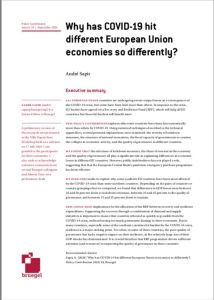
André Sapir
Why has COVID-19 hit different European Union economies so differently?
Bruegel, 2020
What's inside?
European Union-wide disparities in COVID-19 economic losses hold important policy implications.
Recommendation
The coronavirus pandemic hit all members of the European Union hard, but some countries are faring worse economically than others. According to researcher André Sapir's incisive analysis, much of the disparity derives from three factors that vary broadly across EU countries: economic structure, institutional governance and shutdown rigor. This astute overview concludes that, to craft bespoke economic responses, EU leaders will have to parse carefully the drivers behind the slowdowns.
Take-Aways
- The severity of the COVID-19 economic shock on European Union economies differs by country, sometimes significantly.
- Three factors explain the varying degrees of hardship.
- EU officials will have to tailor their relief efforts, focusing on measures to strengthen resilience.
Summary
The severity of the economic shock from COVID-19 on European Union economies differs by country, sometimes significantly.
The economies of Southern Europe sustained a harsher blow from the coronavirus pandemic, as measured by declines in GDP, than their northern counterparts. Denmark, Sweden, Austria and the Netherlands – the “frugal four” – experienced a decrease in GDP that averaged 6.1%. In contrast, Portugal, Spain, Greece and Italy saw an average GDP drop of 10.2% in the first half of 2020.
““Some countries have been hit economically more than others by COVID-19.” ”
The EU Recovery and Resilience Fund (RRF), which EU leaders agreed to in July 2020, will help all members, but the most aid will go to the worse off. Understanding the reasons for the different levels of economic damage will help guide the allocations of assistance.
Three factors explain the varying degrees of hardship.
“Lockdown strictness, tourism, and governance” account for almost two-thirds of the disparities in economic pain from the coronavirus. Clearly, countries with harsher shutdown policies experienced steeper economic falls. The composition of an EU member’s economy determined the extent of the pandemic’s effects: Services such as entertainment, tourism and leisure bore the brunt of the virus. The quality of a country’s governance, manifested in the strength of its public and private institutions, is generally critical to managing fiscal shocks.
““Differences in GDP losses were between 30% and 50% [due] to lockdown strictness, between 35% and 45% to the quality of governance and between 15% and 25% to tourism.” ”
However, prior levels of sovereign indebtedness seemed to have no role in the diverging economic outcomes, indicating that the European Central Bank’s March 2020 pandemic response was correct.
EU officials will have to tailor their relief efforts, focusing on measures to strengthen resilience.
The RRF will provide money both for direct recovery measures and for resilience-building efforts to improve the quality of a member’s governance. The economies that experienced the steepest declines in GDP have the weakest governance; those nations are eligible for the most assistance. Countries receiving RRF help will have to submit plans with specific targets for revamping their economies.
““Each plan will be assessed by the European Commission against various criteria, including ‘strengthening the growth potential, job creation and economic and social resilience’ of the member state concerned.” ”
The challenge for EU officials will lie in how to best divide RRF support between resilience and recovery. Improving a nation’s ability to bounce back from a crisis is a long-term undertaking.
About the Author
André Sapir is a senior fellow with Bruegel.
This document is restricted to personal use only.
My Highlights
Did you like this summary?
Get the ReportThis summary has been shared with you by getAbstract.
We find, rate and summarize relevant knowledge to help people make better decisions in business and in their private lives.
Already a customer? Log in here.



















Comment on this summary